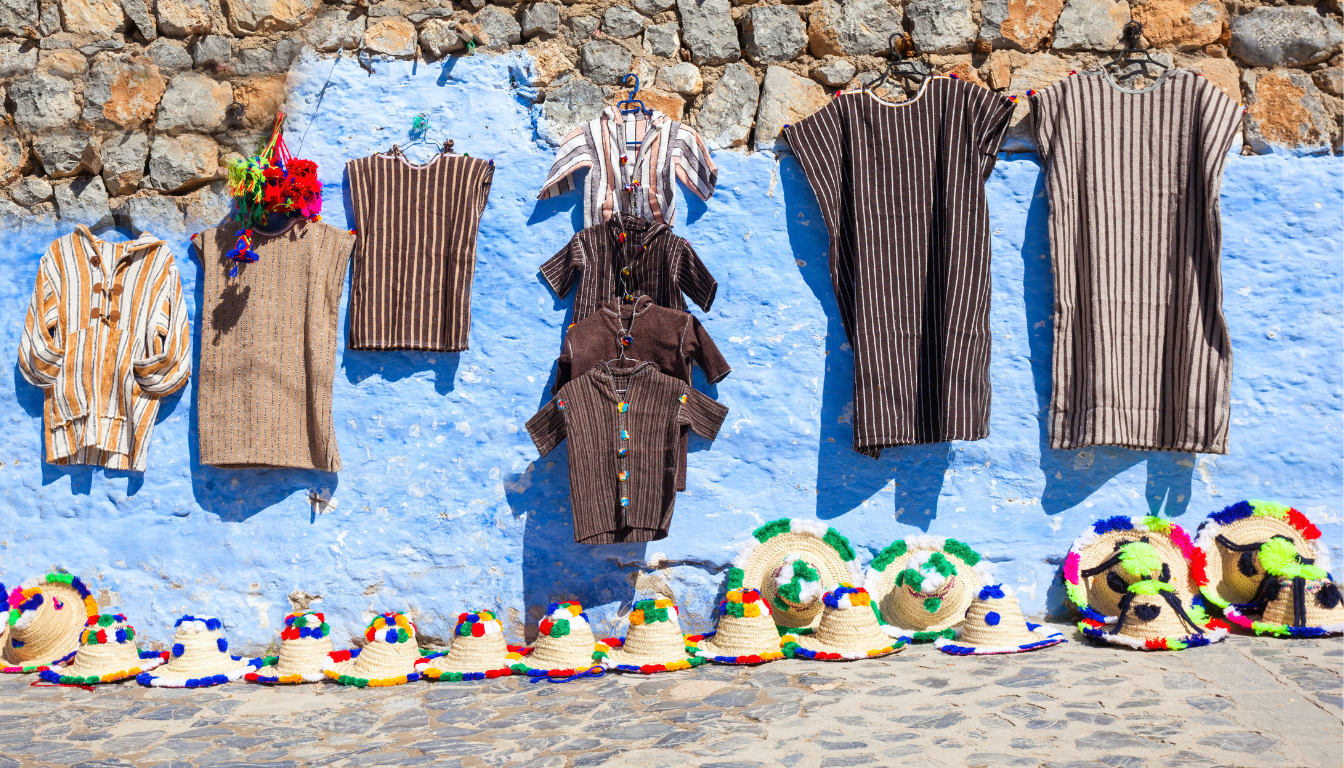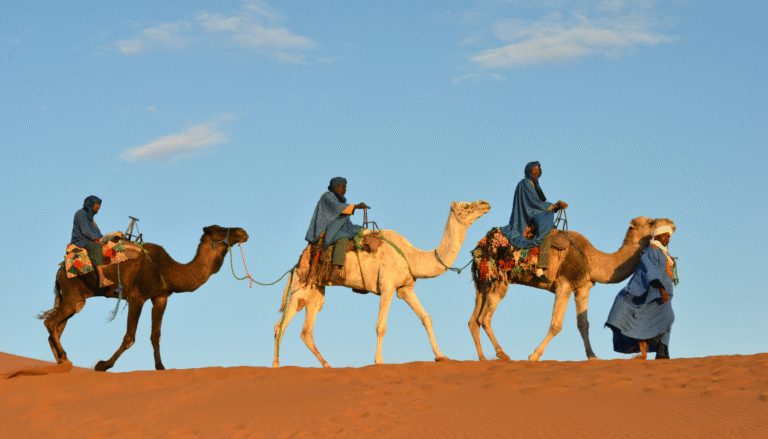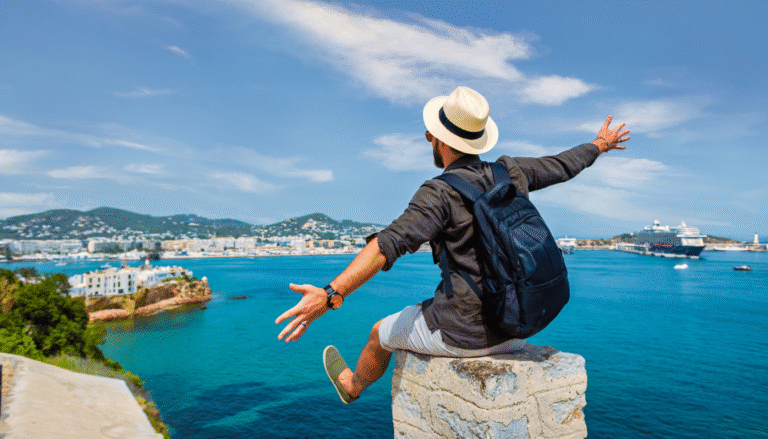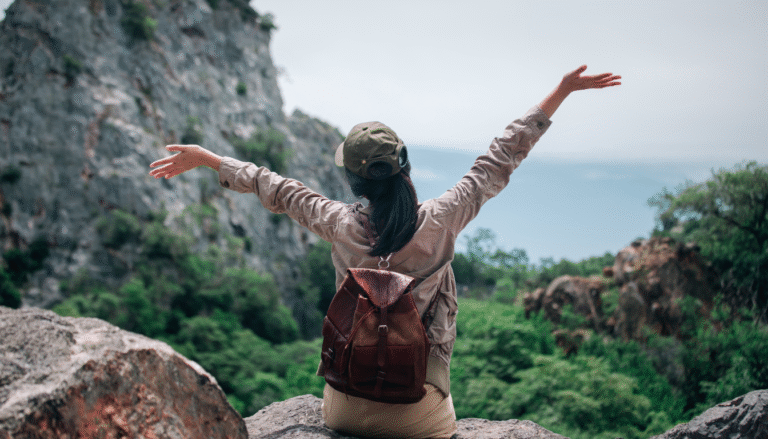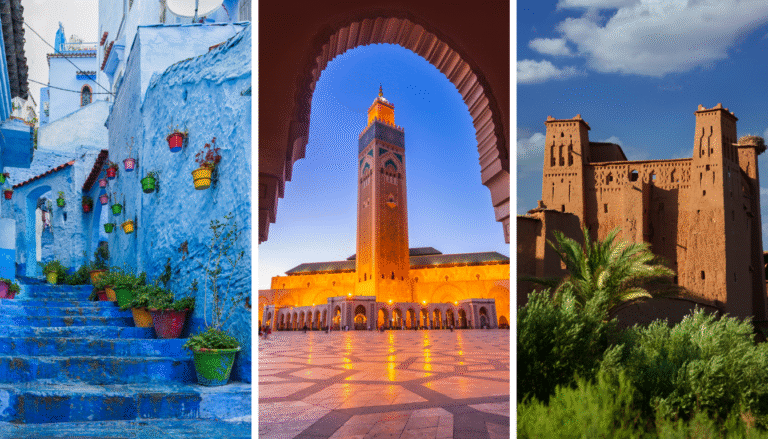What to Wear in Morocco: A Complete Morocco Packing List for Women
Did you know that dressing inappropriately in Morocco can sometimes be seen as disrespecting the local culture? As you prepare for your trip to this beautiful country, it’s important to understand the local dress codes.
Moroccan culture is conservative, focusing on modest dressing. But, this doesn’t mean you have to give up your personal style. By being aware of traditional clothing Morocco and adjusting your wardrobe, you can respect the local customs while staying true to yourself.
You can explore Morocco’s vibrant souks and stunning landscapes with confidence. Knowing you’re dressed right for the local culture makes all the difference.
Understanding Moroccan Dress Culture
Dress in Morocco shows the country’s rich culture. You’ll see both traditional and modern styles as you explore.
Traditional Clothing in Morocco
Traditional clothes in Morocco include long gowns, called jellabas, and scarves. Women wear long, flowing clothes to follow modesty. These outfits are not just pretty but also tell the country’s history.
- Long gowns (jellabas) for comfort and modesty
- Scarves for additional coverage and style
- Intricate embroidery and patterns reflecting local craftsmanship
Modern Moroccan Fashion Trends
Modern Moroccan fashion is different from traditional clothes. In cities like Casablanca and Marrakech, you’ll see young people mixing old and new styles. They create a look that’s both unique and fashionable.
Key elements of modern Moroccan fashion include:
- Mixing traditional fabrics with modern designs
- Incorporating Western-style clothing into everyday wear
- Experimenting with bold colors and patterns
Exploring Moroccan dress culture shows the mix of old and new. This blend makes Morocco’s fashion scene vibrant and interesting.
Being a Woman in Morocco: Cultural Context
For women traveling to Morocco, understanding the local culture is key. Morocco is a place where old traditions meet new ways of thinking. It’s a country that values both its heritage and modern life.
Social Expectations and Norms
As a woman, you should think about what you wear and how you act. You don’t have to cover your hair, but dressing modestly is a good idea. This is true, even in big cities, when you visit places of worship or go to rural areas.
Knowing these social norms helps you get around. It’s useful for shopping at markets or talking to people.
Urban vs. Rural Dress Codes
The way you dress changes a lot depending on where you are. In cities like Marrakech and Casablanca, women can wear modern clothes. But, in rural areas, you need to dress more conservatively.
Knowing these differences helps you pack right. It makes sure you don’t upset anyone and have a better trip.
Balancing Respect and Personal Style
When you’re in Morocco, it’s key to find a balance. You want to respect local customs and also show your personal style. This way, you can enjoy Morocco’s rich culture and stay true to yourself.
Cultural Sensitivity vs. Self-Expression
Moroccan culture values modesty, which is important for women. But, you don’t have to give up your style. You can choose clothes that respect local norms but also show who you are. For example, you can wear clothes that cover your shoulders and knees, but pick colors and patterns that reflect your personality.
The Unwritten Rules of Modesty
Knowing the modesty rules in Morocco makes social situations easier. It’s best not to show your shoulders and knees, for both men and women. Also, women should avoid low-cut shirts that show too much cleavage. Following these rules shows respect for local customs and lets you enjoy Morocco more.
By understanding these cultural rules, you respect Moroccan culture. You also get to dive deeper into the local way of life. This makes your experience more meaningful and fun.
Essential Clothing Items for Women in Morocco
Morocco’s climate and culture need careful packing. As a woman visiting, you’ll want to respect local customs while staying true to your style.
Versatile Tops and Blouses
It’s key to pack tops and blouses that fit Morocco’s climate. Go for lightweight fabrics like cotton or silk. Long-sleeved tunics and shirts are great for layering. Make sure your tops can match with different bottoms.
Bottoms: Pants, Skirts, and Dresses
For bottoms, pick pants, skirts, and dresses that follow local modesty. Long dresses and skirts are best for Morocco’s conservative areas. Don’t forget lightweight pants for casual days.
Layering Pieces and Scarves
Layering pieces and scarves are must-haves for Morocco’s changing weather. A light scarf can keep you warm or cover your shoulders at religious sites. Look for scarves that are also fashionable.
| Clothing Item | Description | Occasion |
|---|---|---|
| Long-sleeved tops | Breathable, modest | Everyday wear, religious sites |
| Maxi dresses | Comfortable, stylish | Casual outings, evening events |
| Lightweight scarves | Versatile, stylish | Layering, religious sites, accessory |
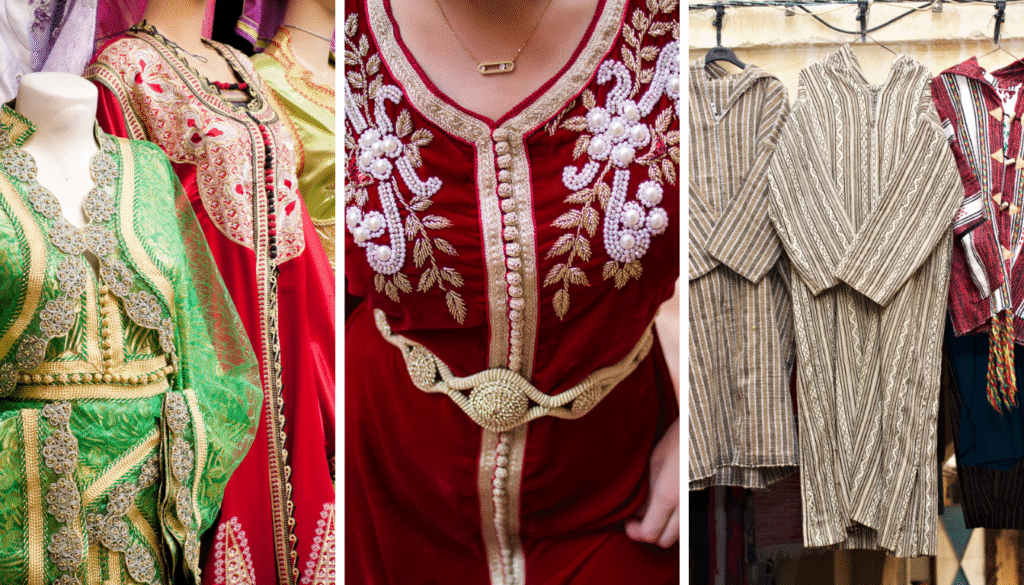
Regional Dress Considerations
Exploring Morocco shows you different dress codes in each area. Knowing these can help you pack right and respect local customs.
Morocco’s rich culture is seen in its varied dress codes. Urban, rural, and coastal areas each have their own styles and rules.
Urban Areas: Casablanca, Rabat, and Marrakech
In cities like Casablanca, Rabat, and Marrakech, dress codes are more open. These places mix modern and Western styles. But, it’s wise to dress modestly, even in modern spots.
Rural and Conservative Regions
Rural areas stick to traditional dress. It’s best to cover your shoulders and knees as a sign of respect. This shows you value their culture.
Coastal Areas and Beach Towns
Places like Essaouira and Taghazout are more laid-back, even in tourist spots. You can wear casual clothes here. But, remember to cover up when not at the beach or pool.
Being aware of these dress codes makes your trip to Morocco better and more respectful.
Seasonal Clothing Guide for Morocco
Morocco’s climate changes with the seasons. Knowing these changes helps you pack the right clothes for your trip.
Summer Attire (June-September)
Summer in Morocco is very hot, even in the desert. You’ll need lightweight, breathable clothing to stay cool. Cotton or linen clothes are good because they let air pass through and keep you comfy.
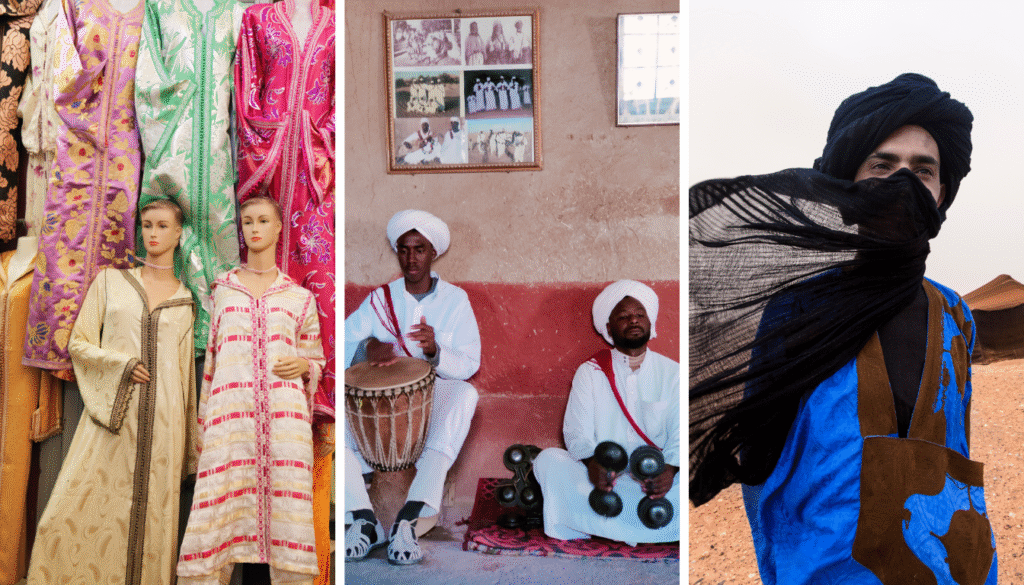
Winter Clothing (November-February)
Winters in Morocco can be chilly, more so in the mornings and evenings. You’ll need warmer layers like fleeces or light jackets. If you’re going to the mountains, bring even warmer clothes because it can get really cold there.
Spring and Fall Transitional Wardrobes
In spring and fall, Morocco’s weather is mild. You can wear versatile clothing that you can layer. These seasons are perfect for city and countryside explorations without the extreme weather.
| Season | Weather | Clothing |
|---|---|---|
| Summer | Hot | Lightweight, breathable |
| Winter | Cool | Warmer layers |
| Spring/Fall | Mild | Versatile, layered |
Dressing for Specific Occasions in Morocco
Exploring Morocco means knowing what to wear for each event. This knowledge makes you feel at ease and shows respect for the Moroccan culture.
Tourist Activities and Sightseeing
For sightseeing, wear layers to handle temperature changes. Comfortable shoes are key for walking in souks and historic spots. Choose light, breathable clothes that cover your shoulders and knees as a sign of respect.
Religious Sites and Mosques
At religious sites or mosques, you need to dress more modestly. Wear clothes that can be easily changed or layered. Scarves are handy for covering your head or shoulders.
Dining and Nightlife
For dining and nightlife, you can dress up. Morocco’s fashion scene is lively, and locals dress up for dinner or nights out. Yet, it’s smart to stay modest, even in trendy areas.
Special Events and Celebrations
At special events like weddings or festivals, dress formally or traditionally. For women, this might mean a caftan or takchita. These outfits showcase Morocco’s rich culture and help empower women in the Maghreb by preserving cultural identity.
Stylish Yet Respectful Outfit Ideas
As a woman in Morocco, you’ll want to find a balance. Morocco is a place where old and new fashion styles meet. This offers many stylish yet respectful outfit ideas.
Casual Day Looks
For casual days, think about wearing loose maxi dresses or long skirts. They are comfy and modest. Add a lightweight scarf for color and sun protection. Maxi dresses are perfect for hot days because they keep you cool and covered.
Evening Ensembles
In the evenings, go for elegant kaftans or stylish tunics with comfy trousers. Adding a statement piece of jewelry can make your outfit pop. It’s great for dining out or checking out the local nightlife.
Adventure and Outdoor Attire
For outdoor adventures, choose comfy and practical clothes like breathable tops and leggings or durable pants. Remember to wear a hat and apply sunscreen to stay safe from the sun.
Incorporating Moroccan Elements into Your Style
You can add traditional Moroccan touches to your outfits. Wear clothes with detailed patterns or bright colors.
“Moroccan fashion is not just about clothing; it’s an expression of culture and identity.”
Adding a Moroccan scarf or handmade jewelry can give your outfit a local flair.
Packing List for Women Traveling to Morocco
When you’re planning a trip to Morocco, a good packing list is key. Morocco is rich in culture and has a conservative vibe. Knowing this helps you pack right.
Essential Clothing Items
Choose clothes that are modest but also comfy. Loose tops and long skirts or pants are great. They show respect and keep you cool.
For hot days, bring a few lightweight dresses. They’re perfect for Morocco’s sunny weather.
Recommended Fabrics and Materials
Choose breathable fabrics like cotton and linen. They’re perfect for Morocco’s climate. These materials keep you cool and comfortable.
Remember to pack a scarf. It’s a lifesaver against the sun and heat. Opt for white or light colors.
Accessories and Footwear
Accessories can make your outfits pop in Morocco. Pick jewelry that’s tasteful and doesn’t draw too much attention. Comfortable shoes are a must for walking.
Also, bring sturdy sandals for warm days. A hat and sunglasses will protect you from the sun.
Shopping for Clothes as a Woman in Morocco
Exploring Morocco, you’ll find a lively shopping scene. It mixes old and new styles. Morocco is where tradition and modernity come together, seen in its varied shops.
Traditional Markets and Souks
Souks, Morocco’s traditional markets, are key to its shopping culture. You can find everything from caftans to colorful scarves and fabrics. Souks are more than shops; they’re a dive into Moroccan culture. Remember, haggling is part of the fun.
Modern Shopping Centers
For a modern shopping vibe, Morocco has malls too. These places have international and local brands. They offer a cool, air-conditioned spot to shop. You can find everything from haute couture to casual clothes. It’s a great way to see how women’s rights in North Africa and gender equality in Morocco are changing through fashion.
| Shopping Venue | Characteristics | Best For |
|---|---|---|
| Traditional Souks | Vibrant atmosphere, traditional clothing, haggling | Unique, cultural experiences, traditional attire |
| Modern Shopping Centers | International brands, comfortable environment, fixed prices | Modern fashion, convenience, variety |
Conclusion: Embracing Moroccan Style While Staying True to Yourself
Exploring Morocco’s vibrant streets is an adventure. It’s important to blend in while staying true to yourself. Understanding the cultural context of women’s status in Morocco makes your journey better. This way, you respect local customs and help empower women in the Maghreb.
Your happiness is the top priority. Morocco is full of cultural wonders, from busy souks to peaceful landscapes. Being respectful lets you dive deep into these experiences. Dressing stylishly yet thoughtfully will enhance your trip, whether in cities or rural areas.
Remember, being comfortable and enjoying your trip is key. Finding a balance between cultural awareness and personal style lets you appreciate Morocco’s beauty. This creates a memorable experience for any woman visiting Morocco.

